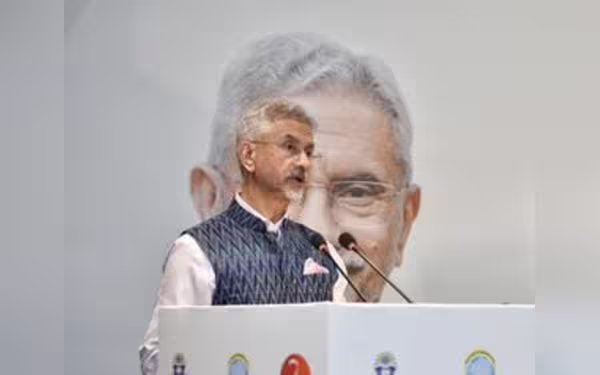Thursday, November 7, 2024 09:57 AM
Jaishankar Highlights Changing Dynamics of International Friendships
- Jaishankar emphasizes non-exclusive friendships in a multipolar world.
- India aims to build relationships with numerous countries.
- Modi's leadership credited for transforming key international partnerships.
 Image Credits: menafn
Image Credits: menafnJaishankar discusses the evolving nature of international friendships in a multipolar world, emphasizing the importance of diverse relationships.
In a world that is increasingly becoming multipolar, the dynamics of international relationships are evolving rapidly. India, under the leadership of External Affairs Minister S. Jaishankar, is navigating this complex landscape with a clear vision. During a recent book launch in New Delhi, Jaishankar articulated that the nature of friendships between nations is changing, emphasizing that these relationships are no longer exclusive. As India aspires to become a leading global power, it is essential to understand the implications of this shift.
Jaishankar pointed out that in a multipolar world, nations will seek to maintain their options, which may sometimes lead to a sense of competition. He stated, "Friendships are also not exclusive, particularly so in a multipolar world. It is only to be expected that others, even friends, will seek to maintain their options while restricting ours." This statement highlights the reality that countries often have to balance their relationships with multiple partners, which can lead to complexities in diplomacy.
Moreover, Jaishankar acknowledged that even friendships come with their own set of challenges. He noted that while some nations may share a culture of mutual respect, others may not. This disparity can lead to misunderstandings and complications in diplomatic interactions. He remarked, "Some friends may also be more complicated than others. They may not always share the same culture of mutual respect, or ethos of diplomatic etiquette." This observation serves as a reminder that international relations are not always straightforward and require careful navigation.
As India positions itself as a 'Vishwamitra' or a global friend, Jaishankar emphasized the importance of building relationships with as many countries as possible. This approach is aimed at generating goodwill and fostering positive international engagement. He stated, "It is reflected in the growing contributions we make to global good and indeed in the closer engagement with the international community." This perspective underscores the idea that diplomacy is not just about political alliances but also about contributing positively to global issues.
Jaishankar also credited Prime Minister Narendra Modi for his leadership in transforming India's relationships with key partner countries over the past decade. He highlighted the significance of the Quad partnership with the US, Japan, and Australia, stating that these relationships have evolved by overcoming historical hesitations. He remarked, "If all these ties have changed so much in the last decade, much of the credit should go to Prime Minister Narendra Modi for his personal interest and leadership." This acknowledgment of Modi's role reflects the importance of strong leadership in shaping foreign policy.
As India continues to assert its presence on the global stage, the evolving nature of international friendships will play a crucial role in its journey. The complexities of these relationships require a nuanced understanding and a strategic approach. As Jaishankar aptly put it, "What is freedom for one can apparently become interference from the other." This statement encapsulates the delicate balance that nations must maintain in their quest for cooperation and mutual respect. In a multipolar world, the ability to navigate these relationships with wisdom and foresight will be key to India's success as a global leader.













